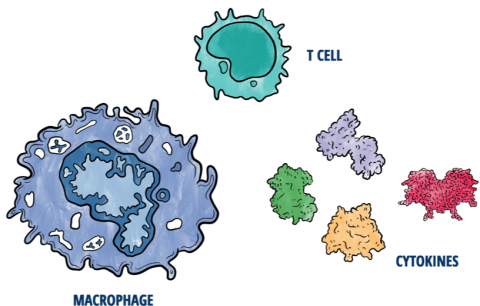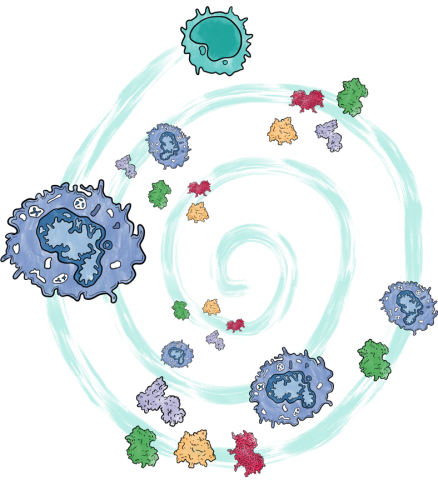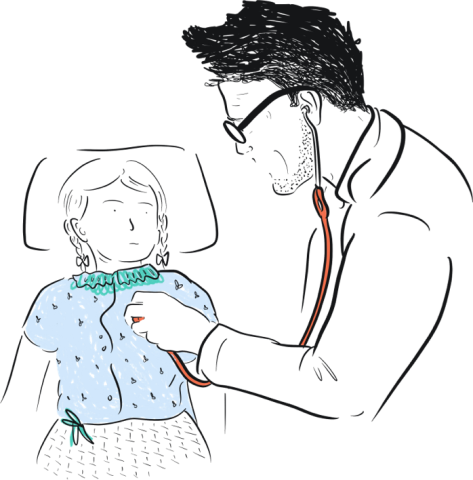Primary HLH is a genetic disease, which means that it can run in families. It is caused by changes, or mutations, in genes that affect how the immune system works.
To understand more about the condition, it’s important to know what happens in the body of someone with primary HLH and what some of the symptoms can be.
What happens in the body?
- Every person has their own immune cells, which work inside the immune system. They travel throughout the body looking for problems, like harmful cells. When they find something suspicious, they bring it to the attention of T cells
- The job of T cells is to search out and destroy the invaders, but they need help. T cells release inflammatory messenger proteins called cytokines that activate macrophages to help the T cells get rid of the problem
- Macrophages are large cells that eat problem cells and white blood substances in the immune system

How does primary HLH cause a cytokine storm?
T cells and macrophages usually work together to keep the body safe. But in primary HLH, they aren’t able to destroy harmful cells. So, the body keeps trying by making more macrophages and cytokines, which causes inflammation.
- T cells keep releasing more and more cytokines, especially one called interferon gamma (IFNγ)
- This activates more macrophages, and these macrophages release even more inflammatory cytokines
- The high level of cytokines creates a cytokine storm, which causes inflammation to get out of control
- This may lead to long-lasting fever, organ damage, and other symptoms of primary HLH
Watch now to see how primary HLH affects the body

Signs and symptoms of primary HLH
While everyone’s condition is different, there are some common signs and symptoms that you and your doctor can look for.
Signs and symptoms may include:
- High fever that lasts a long time
- Rash
- Seizures and neck stiffness
- Yellow color of the eyes and skin (jaundice)
- Swollen lymph nodes (small round structures, like your tonsils, that are part of the body’s immune system and help fight infection or disease)
- Low red blood cell or hemoglobin count (anemia) and looking very pale
- Coughing or trouble breathing
- Stomachache, vomiting, or diarrhea
- Changes in mental state, such as confusion or memory loss
- Problems with vision, such as blurriness
- Swollen or bloated stomach
- Muscle weakness and trouble walking
- Enlarged spleen
- Hepatitis, liver failure, or enlarged liver
- Problems with clotting due to low levels of a protein called fibrinogen
- Elevated levels of ferritin, a protein that stores iron (hyperferritinemia)
- A reduction in the number of mature blood cells (cytopenia)
- Infant/child does not grow or gain weight
Signs and symptoms may include:
- High fever that lasts a long time
- Rash
- Seizures and neck stiffness
- Yellow color of the eyes and skin (jaundice)
- Swollen lymph nodes (small round structures, like your tonsils, that are part of the body’s immune system and help fight infection or disease)
- Low red blood cell or hemoglobin count (anemia) and looking very pale
- Coughing or trouble breathing
- Stomachache, vomiting, or diarrhea
- Changes in mental state, such as confusion or memory loss
- Problems with vision, such as blurriness
- Swollen or bloated stomach
- Muscle weakness and trouble walking
- Enlarged spleen
- Hepatitis, liver failure, or enlarged liver
- Problems with clotting due to low levels of a protein called fibrinogen
- Elevated levels of ferritin, a protein that stores iron (hyperferritinemia)
- A reduction in the number of mature blood cells (cytopenia)
- Infant/child does not grow or gain weight
There may be other signs and symptoms of primary HLH not listed here.

If you think that you or your loved one's symptoms may be getting worse, tell your doctor right away.
